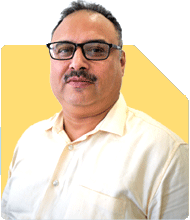Baqar Iftikhar Naqvi | Answer |Ask -Follow
Start-up Mentor - Answered on Mar 01, 2024

We are an ethnic wear brand based out of Kashmir and New Delhi. Can you suggest some practices that we should follow to get on top of the game?
You may like to see similar questions and answers below
Baqar Iftikhar Naqvi | Answer |Ask -Follow
Start-up Mentor - Answered on Sep 14, 2023
Archana Deshpande | Answer |Ask -Follow
Image Coach, Soft Skills Trainer - Answered on Dec 07, 2024
Archana Deshpande | Answer |Ask -Follow
Image Coach, Soft Skills Trainer - Answered on Dec 30, 2024
Dr Ganesh Natarajan | Answer |Ask -Follow
Career Expert - Answered on May 26, 2025
Dr Ganesh Natarajan | Answer |Ask -Follow
Career Expert - Answered on May 31, 2025
Ulhas Joshi |280 Answers |Ask -Follow
Mutual Fund Expert - Answered on Dec 05, 2025
Dr Dipankar Dutta |1835 Answers |Ask -Follow
Tech Careers and Skill Development Expert - Answered on Dec 04, 2025
Ravi Mittal |676 Answers |Ask -Follow
Dating, Relationships Expert - Answered on Dec 04, 2025
Anu Krishna |1745 Answers |Ask -Follow
Relationships Expert, Mind Coach - Answered on Dec 04, 2025
Anu Krishna |1745 Answers |Ask -Follow
Relationships Expert, Mind Coach - Answered on Dec 04, 2025
Mayank Chandel |2562 Answers |Ask -Follow
IIT-JEE, NEET-UG, SAT, CLAT, CA, CS Exam Expert - Answered on Dec 04, 2025
Mayank Chandel |2562 Answers |Ask -Follow
IIT-JEE, NEET-UG, SAT, CLAT, CA, CS Exam Expert - Answered on Dec 04, 2025
Mayank Chandel |2562 Answers |Ask -Follow
IIT-JEE, NEET-UG, SAT, CLAT, CA, CS Exam Expert - Answered on Dec 04, 2025
Mayank Chandel |2562 Answers |Ask -Follow
IIT-JEE, NEET-UG, SAT, CLAT, CA, CS Exam Expert - Answered on Dec 04, 2025
Mayank Chandel |2562 Answers |Ask -Follow
IIT-JEE, NEET-UG, SAT, CLAT, CA, CS Exam Expert - Answered on Dec 04, 2025

























